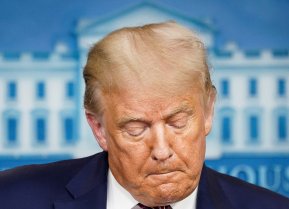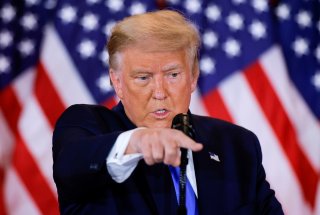Donald Trump’s Reelection Strategy Was the Real Winner Last Night
Here’s the deal: whether he wins or loses the 2020 election, Trump’s campaign strategy has been vindicated. His critics declared that Trump’s polarizing message would rebound on him. Not so. The results from Pennsylvania, Michigan and Wisconsin may not have arrived, but Trump and the GOP’s showing looks to be quite impressive.
In 1960 John F. Kennedy won the popular vote by 0.2 percent against Richard M. Nixon. The election was a nail-biter. There were questions about voting in Illinois and Texas with rumors flying that Chicago mayor Richard Daley and Sen. Lyndon B. Johnson had engaged in ballot stuffing. But Nixon ultimately chose not to contest it. He conceded on November 9, observing that “our country cannot afford the agony of a constitutional crisis.” That was then.
President Donald Trump, by contrast, had no hesitation about declaring victory last night. Standing in the East Room of the White House, he insisted that any further vote-counting end pronto: “This is a fraud on the American public. This is an embarrassment to our country. We were getting ready to win this election. Frankly, we did win this election.”
This should come as no surprise. Trump had wired into his campaign the preemptive claim that it was a “rigged election.” Trump will mobilize his teams of lawyers to try and stop the count, while Biden will deploy his to continue it. “The counting will not stop. It will continue until every duly cast vote is counted. Because that is what our laws — the laws that protect every Americans' constitutional right to vote — require," Biden campaign manager Jen O'Malley Dillon said.
But here’s the deal: whether he wins or loses the 2020 election, Trump’s campaign strategy has been vindicated. His critics declared that Trump’s polarizing message would rebound on him. Not so. The results from Pennsylvania, Michigan and Wisconsin may not have arrived, but Trump and the GOP’s showing looks to be quite impressive. There is a formidable base of white, rural voters that has now propelled Trump in two successive elections. The rural-city divide in America appears stronger than ever.
For one thing, the southern wall appears to have held. Democrats were hopeful that they could take Florida. Not a chance. Latino voters and black men upped their vote counts for Trump. Georgia and North Carolina remain outstanding but are likely to go for Trump. The only state to flip for Biden, at least so far, is Arizona.
What about the vaunted blue wall? Trump cracked it in 2016. Currently, Trump is 700,000 votes ahead of Trump in Pennsylvania. 1.4 million ballots are uncounted. Biden holds a narrow lead in Wisconsin. Trump is narrowly ahead in Michigan. The ballots that are uncounted are likely to be blue, but Trump is betting that the Supreme Court would stop the count in various states. As our own Rachel Bucchino notes, the election might well be decided in a courtroom.
Despite predictions that Trump would drag down Senate Republicans, this does not seem to be the case. In Colorado, John Hickenlooper defeated Cory Gardner. But Joni Ernst, Steve Daines, and Lindsey Graham have all won their races. Susan Collins is poised to win again. The GOP may hold the Senate.
If Biden wins a narrow electoral college victory by claiming Wisconsin, Michigan and Pennsylvania, he will be hamstrung from the outset of his presidency. There is no mandate or realignment for the Democratic party. Quite the contrary. (Humble pie moment: my prediction yesterday that Trump would lose badly was itself flat wrong.)
If Trump does win the election, he will go down as one of the most consequential presidents in American history. His impact in reshaping the government, judiciary and foreign policy will be immense. If Biden wins, he will be most unlikely to have the same effect. If Trump wins, he will once more lose the popular vote. Whoever becomes president, the most likely outcome is a relentless continuation of the polarization of that has afflicted America for the past decade. This is not the end of strife in America. It is just the beginning.
Jacob Heilbrunn is the editor of The National Interest.
Image: Reuters.


